Edie Melson's Blog, page 80
August 10, 2023
Increase the Readability of Every Blog Post You Write with These Tips
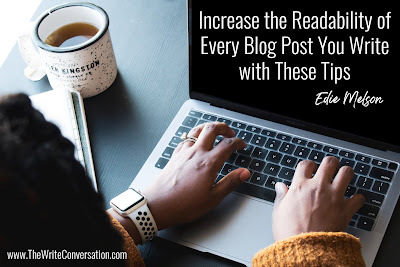
by Edie Melson @EdieMelson
Almost daily I get emails from bloggers who have run into seemingly insurmountable formatting problems. Truthfully there’s not much more frustrating that to finish writing a great blog post and then spend hours trying to get it formatted like you want.
Formatting issues can range extra lines that won’t go away, to font sizes that won’t match. These things can creep into your written copy many ways. And can happen no matter which blogging platform you use.
I’ve even seen a blogger spend a weekend moving a blog from one platform to another to only run into the same exact issue. The easiest way for blogging problems to creep in is by using a word processing program to write your blog, then copying and pasting the text into your blog’s compose window.
BUT, that is exactly what I recommend you do. There are several reasons to compose your posts in a word processing program, like Microsoft Word.Composing in a word processing program gives you a backup of your blog posts in case the unthinkable happens and your blog is erased or compromised.Most word processing programs have some version of spell check. This helps keep your blog posts clean and error free.
However, to make the process of copying from a word processing program to you blog compose wide, there are some formatting you'll want to add later. These are things that aren't compatible with the compose window of your blog.
What to do when you’re composing in a word processor:Bullet points (add those after you copy your post into the compose window).Automatically numbered lists. If you type in the numbers yourself, you’ll be fine. Just don’t let the computer do it for you.Paragraph indentions.Automatic blank line additions before or after a paragraph.
Even if you’re careful to avoid those pitfalls there are times when your formatting just won’t work. To get rid of weird formatting that’s hidden in a word processor’s default programming you could add another step and copy and paste your post into a text editor before you move it to your compose window.
But who wants to add an extra step? Not me, that’s for sure!
So what’s a blogger to do?
Here’s a trick that will make your life easier.Go ahead and compose your posts in a word processor.Then copy and paste the post into your compose window.Next highlight your entire blog post.Now here comes the trick—look for the small icon at the top of your compose window that either says REMOVE FORMATTING or CLEAR FORMATTING. It may look like a capital T with a small red x beside it or like an eraser. Highlight the misbehaving text and then click this button. It will remove any formatting you’ve inadvertently brought over from your word processing program.
Now go to the beginning of your post and put in any formatting you want to include.
Now it’s your turn, what tricks do you use to make blogging easier? What issues do you have trouble with? Post your comments below and we’ll all learn from each other.
Don’t forget to join the conversation!
Blessings,Edie
TWEETABLEIncrease the Readability of Every Blog Post You Write with These Tips from @EdieMelson (Click to Tweet)
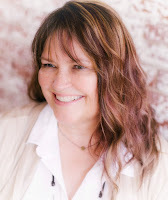 Edie Melson is a woman of faith with ink-stained fingers observing life through the lens of her camera. No matter whether she’s talking to writers, entrepreneurs, or readers, her first advice is always “Find your voice, live your story.” As an author, blogger, and speaker she’s encouraged and challenged audiences across the country and around the world. Her numerous books reflect her passion to help others develop the strength of their God-given gifts and apply them to their lives.Connect with her on her website, through Facebook, Twitter and on Instagram.
Edie Melson is a woman of faith with ink-stained fingers observing life through the lens of her camera. No matter whether she’s talking to writers, entrepreneurs, or readers, her first advice is always “Find your voice, live your story.” As an author, blogger, and speaker she’s encouraged and challenged audiences across the country and around the world. Her numerous books reflect her passion to help others develop the strength of their God-given gifts and apply them to their lives.Connect with her on her website, through Facebook, Twitter and on Instagram.Featured Image: Photo by Daniel Thomas on Unsplash
Published on August 10, 2023 22:00
August 9, 2023
Verses Versus VERSUS: Why Every Writer Needs to Edit, Edit, Edit

by Julie Lavender @JLavenderWrites
Some might say “it’s a good problem to have,” but in my writing, I tend to use the word verses more often than its homonym, versus. Especially since January when I joined the read-through-the-Bible-in-two-years opportunity, STOP2Read, coordinated by our friends Edie Melson and Cynthia Cavanaugh. We often chat amongst ourselves in the commentary section about favorite verses from the day’s passage, challenging ones, puzzling verses, and especially inspiring words. I’m quite happy that my day lends itself to conversation about God’s Word rather than the need for a word that usually signifies opposition or contradiction or maybe making a difficult choice.
Which brings me to last month’s typo …. My previous column in The Write Conversation compared and contrasted writing retreats and writing conferences. Whereas both have been beneficial to my writing, finances and time constraints often cause me to choose one over the other, a difficult choice usually.
I aptly titled me article, “Writing Conferences verses Writing Retreats – What’s Your Favorite?” (Did you catch it? Would your high school English teacher be pleased or disappointed?)
You guessed it—I used the incorrect homophone verses instead of the correct word: versus. Fortunately, a more astute reader and editor than I am caught the mistake and reversed the error … (see what I did there?)
Why Every Writer Should Edit, Edit, Edit
My blunder brought to mind a couple of other famous (or infamous?) typos and mistakes I’ve heard about in the past. I Googled some examples to share with you, just for fun, in case you haven’t heard of these. Disclaimer—I didn’t research these slip-ups extensively, because, after all—I found them on the Internet, so I’m quite certain they’re infallible.
Apparently, even God’s Holy Word isn’t exempt from error WHEN mankind gets ahold of His words. In 1631, a printing of the Bible left out one little tiny, three letter word: not. The problem? The typo occurred in the seventh commandment that should have read: “Thou shalt not commit adultery.” And a 1795 edition of the King James Bible swapped just one letter, changing the word “filled” in Mark 7:27 to “killed,” rendering the inaccurate verse: “Let the children first be killed.”
A three-letter word, one letter. No big deal? Not hardly.
Not letters, but transposed numbers in a 1955 Sears advertisement in a Colorado newspaper led to a child’s phone call to a top secret military number, known only to a colonel and a four-star general at the Pentagon. “Is this Santa Claus?” the youngster asked. An angry Colonel who didn’t like pranks, a heartbroken child’s tears, and an eventual call to the local radio station resulted in the birth of a Santa tracking system.
Another phone service disaster didn’t have quite the happy ending. Well, perhaps it did eventually. In 1988, the owner of a travel service sued the phone company for $10 million dollars due to the mental anguish and misery she experienced when her yellow pages ad typed one wrong letter to erroneously describe her “exotic travel services” as a different type of travel service completely. The company refunded her $230 ad fee, and the judged awarded her request of $10 million.
In the 1925 novel written by Theodore Dreiser, An American Tragedy, based on a real-life murder case probably had more than one typo on its 900 pages, but one particular error described two characters as “harmoniously abandoning themselves to the rhythm of the music—like two small chips being tossed about on a rough but friendly sea.”
Some written typos and blunders are comical—in quite humorous fashion, social media boasts throngs of them (good thing I remembered the “r” in that word just before “of” or we’d be discussing a totally different aspect of social media). But a huge number are costly and embarrassing, and a host of them show a lack of professionalism and editing proficiency.
Edit, Edit, Edit, Repeat.
Mistakes happen. If you find a typo or written blunder in your published works, give yourself grace and strive to do better next time. Here’s a few editing tips, in random order, to help you watch for those pesky slip-ups and errors. (These suggestions address typo-type blunders, not big-picture ones like plot in fiction and misunderstanding in non-fiction. Nor do these tips address searching for unnecessary adverbs, weak nouns and verbs and so on. Make sure to include these points in your editing process, too!)
Set your manuscript aside for several days or even a couple of weeks. When you read it again, you won’t be as “close” to the words you wrote and glaring errors might jump out at you. You’ll be less likely to skim right past the mistakes if you aren’t anticipating the next word you wrote. Read your manuscript aloud. You’ll be surprised how many mistakes you catch that way!Check the spellings of specific words like ebook or eBook and the capitalizations of Deity pronouns and be consistent throughout the manuscript. You can do this easily with a couple of word-search or “find and replace” clicks.Print out your manuscript and edit a printed version, rather than just reading on the computer. Read the work backwards. This method often catches misspelled words or misused homonyms. Read word by word for spelling errors or read sentence by sentence, from bottom to top, to check grammar without the distraction of content.Check one error at a time. Go through the whole manuscript looking only at end punctuation. All good? Then move on to subject—verb agreement. Next, study each word for spelling accuracy. Additionally, check for common blunders, like they’re versus there versus there. Also, you're versus you’re. Don’t forget it’s, its, to, two, and too, too. And for goodness sake, check words like “public” and “throng” to make sure every letter shows up!Share your manuscript with a critique group. Someone unfamiliar with your work will catch typos and mistakes on a first-read, ones that you’ve read right past a hundred times because of your closeness to the piece.
Now it’s your turn. What’s your worst writing blunder? Share with us and join the conversation. We want to learn from your mistakes, to. (Just kidding … checking to make sure your still wearing you’re editing hat.)
I’ll share one more of mine. Not in publication form, but a texting error. I once sent a sweet friend an encouraging text late at night in anticipation of her very serious surgical procedure the next morning. I ended my text, “I’m praying for you, my dead friend.” Needless to say, I was mortified!
TWEETABLEVerses Versus VERSUS: Why Every Writer Needs to Edit, Edit, Edit @JLavenderWrites on @EdieMelson (Click to Tweet)
 Julie Lavender is thankful for her husband’s red pen, the brilliance of her Word Weavers critique sisters, and English teachers of the past. Without their help, she might not be the author of Children’s Bible Stories for Bedtime and Strength for All Seasons: A Mom’s Devotional of Powerful Verses and Prayers, both published by Penguin Random House; 365 Ways to Love Your Child: Turning Little Moments into Lasting Memories, published by Revell, two children’s picture books forthcoming from End Game Press and its imprint, and other publications.
Julie Lavender is thankful for her husband’s red pen, the brilliance of her Word Weavers critique sisters, and English teachers of the past. Without their help, she might not be the author of Children’s Bible Stories for Bedtime and Strength for All Seasons: A Mom’s Devotional of Powerful Verses and Prayers, both published by Penguin Random House; 365 Ways to Love Your Child: Turning Little Moments into Lasting Memories, published by Revell, two children’s picture books forthcoming from End Game Press and its imprint, and other publications.
Published on August 09, 2023 22:00
August 8, 2023
4 Things That Remind Us Our Writing Has Value and Impact

by Linda Gilden @LindaGilden
“If you want to change the world, pick up a pen.” This is one of my favorite writing quotes and is from Martin Luther. Since the moment I heard it, I knew I had heard directly from God as to my calling.
I had always wanted to do something that made a difference. When I first started writing, I was content to write in my office and have a few things published. But sitting there all alone with my computer, didn’t make me feel like a world changer. Looking across the top of my computer out the window at the vast landscape in front of should have been inspirational. Instead because it was all the world I could see every day, it felt very small.
Several things helped me change my perspective about the impact of my writing.I had peace about what I was doing. I didn’t feel restless to go do something else. God had called me to be a writer and I was learning the craft. With each successful placement of my work, I had the opportunity to touch or change a life.I ceased to worry about how I fit in the writing world and concentrated on doing what God had called me to do. Some like to approach the writing world as a competitive venue. God has a special message for every writer to communicate in a way that is unlike any other writer’s style. I needed to let my uniqueness overflow onto every page.I began to receive bits of encouragement from others. Friends commented on my writing, a note or two arrived from people I didn’t even know, my passion continued to grow, aspiring writers asked me for advice.Second Corinthians 3:3 says, “You are a letter from Christ…written not with ink but with the Spirit of the living God, not on tablets of stone but on tablets of the human heart.” Whether my words are on a computer or spoken by the way I live, I am God’s messenger to the world and others are reading.
Yes, being a writer is a pretty solitary job. However, very few other professions have the opportunity to take their messages directly to their audiences. Can you be a world changer? Absolutely. How? One word at a time reaching one heart at a time.
TWEETABLE4 Things That Remind Us Our Writing Has Value and Impact from @LindaGilden on @EdieMelson (Click to Tweet)
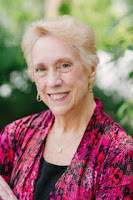 Linda Gilden is an award-winning writer, speaker, editor, certified writing and speaking coach, and personality consultant. Her passion is helping others discover the joy of writing and learn to use their writing to make a difference. Linda recently released Articles, Articles, Articles! and is the author of over a thousand magazine articles and 23 books including the new LINKED Quick Guides for Personalities. Trading Shadows will be released in a few months. Linda’s favorite activity (other than eating folded potato chips) is floating in a pool with a good book surrounded by six of the cutest splashing grandchildren in the world—a great source of writing material! www.lindagilden.com
Linda Gilden is an award-winning writer, speaker, editor, certified writing and speaking coach, and personality consultant. Her passion is helping others discover the joy of writing and learn to use their writing to make a difference. Linda recently released Articles, Articles, Articles! and is the author of over a thousand magazine articles and 23 books including the new LINKED Quick Guides for Personalities. Trading Shadows will be released in a few months. Linda’s favorite activity (other than eating folded potato chips) is floating in a pool with a good book surrounded by six of the cutest splashing grandchildren in the world—a great source of writing material! www.lindagilden.comFeatured Image: Photo by NordWood Themes on Unsplash
Published on August 08, 2023 22:00
August 7, 2023
Make the Dialect You Write Shine with These 4 Tips

by Cindy K. Sproles @CindyDevoted
Everyone is known for something, and me—well, it's my mountain dialect. I learned years ago that when you hail from the mountains of East Tennessee, folks are going to rag you about your accent. I decided to roll with it.
The dialect makes me who I am, which is not such a bad thing. For me to translate that dialect into viable dialogue took a little practice. There were some things I had to come to grips with, like the cultural differences across the country. It was wrong to simply assume everyone understood the concept of going "across the gap"—something so second nature to me in both doing and speaking became a stumbling block for those above the Mason-Dixon.
As much as I love my mountain heritage and dialect, in order for it to come across as both understandable and realistic, I had to put the brakes on from time to time. Learning to write the dialogue and dialect that you speak requires thought. Follow these tips to help you pen amazing dialect in your dialogue.
4 Tips for Writing Dialect
1. Remember, everyone doesn't know your culture: Whether you are from the mountains of upper East Tennessee or the western United States, culture plays a heavy part in the dialect of the area. Just because you understand a particular phrase or unique word doesn't mean your readers will. For example: When I lived in a small town just outside of Charleston, S.C., I didn't understand the culture of those born and bred in the deep south. So, when a kind gentleman in our church asked if he could tote me home, I was taken back. Tote was a bag (I know, even in the mountains of Tennessee). It didn't make sense. What he was asking was could he drive me home. I'd never had anyone offer to "tote" me home before. All I could imagine was someone stuffing me into a brown paper bag, which certainly couldn't end well. Before you write geographically cultural phrases, think about:The importance of that word choice to the story Consider offering some insight to the reader with a follow-up phrase to help them clarify
As an editor, I ran across a lady from upper Pennsylvania who described a bicycle in a very unique way. I ran it past four editor friends, none of whom had heard of the phrase. When I asked her to remove it or change it up, so the average reader understood, she hit the ceiling. To her, that was correct. Everyone should understand it, but that's not how things are. Be flexible with your cultural phrases and help clarify or offer a way to understand the sentences around the phrase.
2. Spellin' Ain't All It's Cut Out to Be: I can throw myself under the bus since I'm writing this post. As a writer of Appalachian Historical, dialect is everything to bring a certain realistic tone into the story. But you have to be wise.
Editors wanted to leave off the ing in my mountain words, i.e., seein, hearin, tastin. And that was fine, but their editing minds sooo wanted the apostrophe at the end of the word. Seein', hearin', talkin', hurtin'. It didn't take long for them to realize all those little apostrophes grew insanely annoying, so they returned to my original way of writing the word—without the apostrophe.
A second thing that came into play with this lazy way of talking was that if there was a more educated character in the scene, how did we allow them to talk? We let them use the ing on their words to denote a more educated person. Sounds easy. No, it meant the writer had to pay attention and craft the scenes appropriately, and when there is a dialogue between the two, know when to use the ing and when not.
3. Overuse of those lazy words: again, this goes back to being particular about what to use in dialect or not. Sometimes we opt to use lazy words in the dialogue, but in internal dialogue, we mix it up. This helps the reader fully understand the use of the dialect without running it into the ground.
4. Don't allow your dialect and dialogue to make your characters stupid: At least not unless they are supposed to be. You can have an uneducated individual who carries on perfectly normal conversation. Just because they have a certain dialect or accent doesn't a stupid character make. Pay attention to the details and write reality, not stupidity. Some of my wisest characters have the deepest accents and unique phrases. Make their dialogue raise their personality, not lower it.
And with that, I share a fast story. A few years back, two women walked in discussing accents while in the restroom at a conference. Their accents were very mid-western, and apparently, to these two ladies, that was the perfect accent—unless it was British. There was a conferee there with a deep British accent; to these ladies, it was beautiful. Then there was that hillbilly who just sounded stupid (that hillbilly was me, and I was called by name). I'm proud of my mountain heritage, and after talking to a male faculty peer and asking him if my accent made me appear stupid, he was dumbfounded. "Your accent makes you approachable. And when you write your accent, phrases, and lingo, your readers feel like they're wrapped in a warm mountain blanket."
I don’t tell you this to draw sympathy, but to show you how dialect affects others. This proves the importance of writing your characters with the right dialect. Write it as you speak it. Don't force it. When you force it, your readers notice immediately. I find that writers often overwrite dialogue and dialect trying to drive home a point. Instead of driving home the point, they drive away the reader.
Study dialogue and dialect. Pay attention to how folks speak. Do your homework. Nothing drives a reader away faster than bad dialogue. Craft your phrases carefully and if there is a word or phrase that stumps the reader—take it out.
Writing is a true craft, and each part is vital to the success of a good story. I can't say it enough—learn the craft, and your stories will sing.
One last word of advice—never assume the restroom is empty. 😊
TWEETABLEMake the Dialect You Write Shine with These 4 Tips from @CindyDevoted on @EdieMelson (Click to Tweet)
 Cindy K. Sproles is an author, speaker, and conference teacher. Having served for a number of years as a managing editor for Lighthouse Publishing of the Carolinas and Ironstream Media, Cindy now works as a mentor, coach, and freelance editor. She is the co-founder of Writing Right Author Mentoring Services with Lori Marett and she is the director of the Asheville Christian Writers Conference. Cindy is also the co-founder of Christian Devotions Ministries and WWW.CHRISTIANDEVOTIONS.US, as well as WWW.INSPIREAFIRE.COM. Her devotions are in newspapers and magazines nationwide, and her novels have become award-winning best-selling works. She is a popular speaker at conferences and a natural encourager. Cindy is a mountain girl, born and raised in the Appalachian mountains, where she and her husband still reside. She has raised four sons and now resorts to raising chickens where the pecking order is easier to manage. You can visit Cindy at WWW.CINDYSPROLES.COM or www.wramsforwriters.com.
Cindy K. Sproles is an author, speaker, and conference teacher. Having served for a number of years as a managing editor for Lighthouse Publishing of the Carolinas and Ironstream Media, Cindy now works as a mentor, coach, and freelance editor. She is the co-founder of Writing Right Author Mentoring Services with Lori Marett and she is the director of the Asheville Christian Writers Conference. Cindy is also the co-founder of Christian Devotions Ministries and WWW.CHRISTIANDEVOTIONS.US, as well as WWW.INSPIREAFIRE.COM. Her devotions are in newspapers and magazines nationwide, and her novels have become award-winning best-selling works. She is a popular speaker at conferences and a natural encourager. Cindy is a mountain girl, born and raised in the Appalachian mountains, where she and her husband still reside. She has raised four sons and now resorts to raising chickens where the pecking order is easier to manage. You can visit Cindy at WWW.CINDYSPROLES.COM or www.wramsforwriters.com.Featured Image: Photo by Hester Qiang on Unsplash
Published on August 07, 2023 22:00
August 6, 2023
What My One-Year-Old Can Teach Us Writers
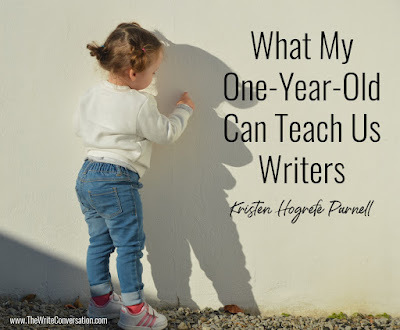
by Kristen Hogrefe Parnell @KHogrefeParnell
My little boy celebrated first birthday last month. He’s looking less like a baby and more like a pre-toddler. The crawling and furniture coasting will turn into walking, then running, any day now.
As I think back over the year, I’m amazed at how quickly time has gone and how much my little guy has grown. In the process, he’s taught me some lessons that apply not only to life, but also to writing as well.
3 Things My One-Year-Old Can Teach Writers
#1: Sometimes, you’re just not ready. Give yourself time and grace.
I remember the first few times I tried giving my baby solid food. He hated it! At first, I was so worried that he wasn’t accepting it like other babies I knew, and then my mom reminded me that she’s never met a teenager who drinks milk out of a baby bottle.
Of course, she was right. Sometimes, we simply need to grow up a little more. Today, my boy shovels food in his mouth so fast that I can hardly keep up!
As writers, we can grow impatient that we haven’t accomplished a goal or we aren’t farther along on our publication dream. Often, we might just need more time: time to grow in our craft, develop our platform, revise our manuscript, or find a professional (editor, agent, or both) to work alongside us.
Don’t get discouraged by the delay. Be encouraged that somewhere down the road will be your time.
#2: Stop comparing milestones.
As a first-time mom, I soon learned the emphasis pediatricians and parents place on “milestones.” Each month, there’s something new babies are supposed to achieve.
The trouble is, every baby develops at a slightly different rate. Some can say “mama” at seven months, while others might not utter words until around their first birthday.
My little guy was so focused on physical accomplishments (army crawling to regular crawling to coasting) that he seemed less interested in verbal feats. I spent too much time stressing about babbling and words. When he did start babbling into his tenth month, I felt a wave of relief—and I also felt a little silly for having worried.
Which of us writers haven’t compared our journey to someone else’s? So-and-so signed with an agent or announced a three-book contract. So-and-so won half a dozen awards. Social media certainly doesn’t help the struggle that comes from comparing ourselves or worrying that we’re somehow “behind.”
Just as babies each develop at their own speed, we writers need to accept that everyone’s journeys look different. We need to stop comparing milestones and instead cheer for others’ successes and lean into our own celebrations when the time comes.
#3: You will get bumps and bruises. Get back up and keep going.
We have tile flooring and carpet in our house. Guess which one our boy prefers?
The tile.
And which one is less forgiving?
The tile.
My little guy was climbing the wall (literally) while I was in the kitchen. Next thing I heard was a “splat” and a wail. Mr. Explorer had lost his footing and lay sprawled with his back on the tile, bawling. He’d smacked his head.
I dropped everything to scoop him in my arms and “kiss and make it better.” Wouldn’t you know? Minutes later, he pushed me away to go adventure on the tile again.
We writers know too well the pain that comes from rejection and the red pen. A few months back, I finished some rewrites on my novel releasing this November. I’d gotten some criticism from one of the editors. The words stung, but I also welcomed the chance to improve the story.
I’m a believer that the bumps and bruises make us stronger and make our writing better. I may not like a tough critique, but I sure prefer it during the editing stage from someone with my best interest at heart than from a reviewer.
Can you relate to these ideas? I hope the lessons I’ve learned from my son encourage you in your journey.
TWEETABLEWhat My One-Year-Old Can Teach Us Writers from author @KHogrefeParnell on @EdieMelson (Click to Tweet)
 Kristen Hogrefe Parnell writes suspenseful fiction from a faith perspective for women and young adults. Her own suspense story involved waiting on God into her thirties to meet her husband, and she desires to keep embracing God’s plan for her life when it’s not what she expects. Kristen’s books have won the Selah Award and the Grace Award, among others, and her inspirational romantic suspense novel, Take My Hand, is now available. An educator at heart, she also teaches English online and enjoys being a podcast guest. Kristen lives in the Tampa, Florida area with her husband and son. Connect with her at KristenHogrefeParnell.com.
Kristen Hogrefe Parnell writes suspenseful fiction from a faith perspective for women and young adults. Her own suspense story involved waiting on God into her thirties to meet her husband, and she desires to keep embracing God’s plan for her life when it’s not what she expects. Kristen’s books have won the Selah Award and the Grace Award, among others, and her inspirational romantic suspense novel, Take My Hand, is now available. An educator at heart, she also teaches English online and enjoys being a podcast guest. Kristen lives in the Tampa, Florida area with her husband and son. Connect with her at KristenHogrefeParnell.com.Featured Image: Photo by Susana Coutinho on Unsplash
Published on August 06, 2023 22:00
August 5, 2023
For Seasoned Writers: Keep Listening and Learning, Part Two in Seasons of Stewardship
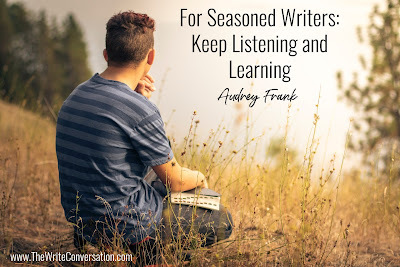
by Audrey Frank @AudreyCFrank
See last month for For New Writers: Take Time to Grow, Part One in Seasons of Stewardship by Audrey Frank
The Lord was with Samuel as he grew up, and he let none of Samuel’s words fall to the ground.1 Samuel 3:19
Samuel told all the words of the Lord to the people who were asking him for a king.1 Samuel 8:10
Nathan replied to the king, “Whatever you have in mind, go ahead and do it, for the Lord is with you.” But that night the word of the Lord came to Nathan, saying, “Go and tell my servant David, ‘This is what the Lord says: Are you the one to build me a house to dwell in?” 2 Samuel 7:3
The Lord was with Samuel as he grew, and He did not let any of his words fall to the ground. The rest of Samuel’s life was marked with powerful simplicity: “Samuel told all the words of the Lord to the people…”
Telling all the words of the Lord to the people included teaching and mentoring younger word-stewards. According to Jewish history, among Samuel’s students was a young scholar named Nathan. Although the author of 1 and 2 Samuel is unknown, it is commonly believed that Nathan recorded the events of 2 Samuel. In any case, Samuel’s student modeled what he learned from his mentor: a listening and teachable heart.
One measure of maturity for writers is a lifelong willingness to continue listening and learning from the Giver of Words.
The more words I produce in my life, the greater vigilance I must practice. A listening, teachable heart must be guarded. It is natural to make expertise the goal. It is unnatural to remain surrendered and teachable. Therefore the seasoned writer must exercise discipline to ensure an experienced heart does not become a closed heart.
We who follow Jesus steward words differently than those who do not know the One who created the world with words. There should be an awe about us than never wanes. There is a wildness about our Word-Giver, an unpredictability about His creativity and the potential of His great power to constantly do something new. He broods over our darkness, bent on creation. And He creates using words.
I want to be ready, my pen poised like the proverbial lamp filled with oil. My pen is my lamp and His voice is my ink. I want to share the words He gives, words with power to make things new.
So I must remain alert, listening, willing to learn, no matter how many books I have published or words I have written.
Nathan was a listening learner and also understood that his words were servants to the Word. He was not ashamed to retract his words if they were in error. A seasoned word steward continually surrenders her words to the greater authority of the Lord. When King David sought Nathan’s advice about building a house for God, Nathan answered without first seeking the Lord. He answered without much thought, with the wisdom he had, and gave an answer that seemed right to him.
But as he slept that night, the Lord spoke a different message to him for the king. Because Nathan was a surrendered listener and learner, he heard God’s words and obeyed, giving no thought or apology for the opposite counsel he had given the day before.
A seasoned word steward is under the full authority of the Lord’s words. He does not strive for his own merit and authority. He only serves the Lord, not himself. Humility is another hallmark of the mature writer who follows Jesus.
Listen, learn, and be humble, seasoned writer.
Lord, grant me a teachable heart. Help me listen to Your words and humbly give them to others. Amen.
TWEETABLEFor Seasoned Writers: Keep Listening and Learning, Part Two in Seasons of Stewardship from @AudreyCFrank on @EdieMelson (Click to Tweet)
Don't Miss the Other Post in this Series! For New Writers, Take Time to Grow For Seasoned Writers: Keep Listening and Learning
 Audrey Frank is an author, speaker, and storyteller. The stories she shares are brave and true. They give voice to those whose words are silenced by shame, the hard things in life that don’t make sense, and the losses that leave us wondering if we will survive. Audrey and her family have spent over twenty years living and working among different cultures and world views, and she has found that God’s story of redemption spans every geography and culture. He is the God of Instead, giving honor instead of shame, gladness instead of mourning, hope instead of despair. Although she has three different degrees in communication and intercultural studies, Audrey’s greatest credential is that she is known and loved by the One who made her.
Audrey Frank is an author, speaker, and storyteller. The stories she shares are brave and true. They give voice to those whose words are silenced by shame, the hard things in life that don’t make sense, and the losses that leave us wondering if we will survive. Audrey and her family have spent over twenty years living and working among different cultures and world views, and she has found that God’s story of redemption spans every geography and culture. He is the God of Instead, giving honor instead of shame, gladness instead of mourning, hope instead of despair. Although she has three different degrees in communication and intercultural studies, Audrey’s greatest credential is that she is known and loved by the One who made her.Audrey is the author of Covered Glory: The Face of Honor and Shame in the Muslim World (Harvest House Publishers), an outpouring of Audrey’s heart to introduce others to the God of Instead. Shame is not unique to the developing world, the plight of the women behind veils, young girls trafficked across borders; shame is lurking in hearts everywhere. Through powerful stories from women around the world, Covered Glory illuminates the power of the Gospel to remove shame, giving honor instead. Available at favorite booksellers: BARNES & NOBLE , BOOKS A MILLION, AMAZON.
Published on August 05, 2023 22:00
August 4, 2023
4 Tips to Help Us Declutter our Writing Lives
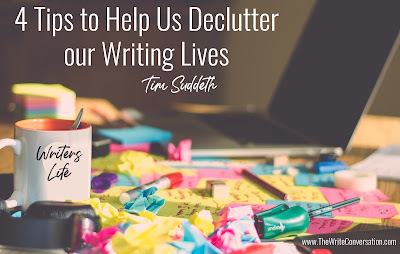
by Tim Suddeth @TimSuddeth
Recently, my wife and I cleaned out the clutter from one of our rooms. The stack began innocently enough with just a couple of boxes. Then we stacked on a couple of more. And a couple of bags. You know how it works.
Things you have lain to the side, over time, becomes clutter. The Merriam/Webster defines clutter as a crowded or confused mass or collection. I define it as a mess.
The pile in our room didn’t happen overnight. It was a little over time.
Then, soon, it became the room we didn’t want to enter. The one we hid from guests.
One of the biggest problems the pile gave us was that it took up space in our house that we really needed to use.
It seems we are in good company. One in eleven Americans pay to use a self-storage container. According to 2018 statistics, there are over 23 million individual storage units in the US. 90% of them are filled.
And recent studies show that 25% of people with two-car garages never park in them.
Now, having things isn’t wrong, but when it becomes clutter and keeps us from enjoying them and the space they take up, it becomes a problem.
I can also see how clutter has snuck into my writing.
Where Clutter Can Sneak Into a Writer’s Life:
1. Physical Space
Virginia Woolf said that “a woman must have money and a room of her own if she is to write fiction.”
Wouldn’t that be great? To have a room or place dedicated to our work, where we can leave our papers lying out without worrying that someone will disturb them. But that’s not how it works for many of us. Especially if there are kids in the house. A kitchen table, a local coffee shop, or part of the couch might have to do.
I have some friends whose office became their car during their children’s sport’s practice.
Looking at my desk, I see that the clutter blob is threatening to take over. The papers that I’ve stacked on the ‘organizer’ — that were too important for me to throw away, but now I don’t have a clue why they’re here — keep me from spreading out the papers I’m using.
I feel like I need to wear a hard hat in case of an avalanche.
2. Mental Space
Writing takes focus. Which isn’t easy to find with work, family, chores, doctor visits, friends. Just life taking up so much energy. We try to pack so much into our lives and sometimes, as they say, life happens.
We laugh when we hear about someone coming back into the den with a look of deep concentration on their face.
They’re trying to remember why they went to the kitchen. Then they realize they’re holding their empty coffee cup.
I love how Cindy Sproles says that we need to remember to give ourselves grace. Maybe take a day or so off. At least take a walk and listen to the songs of the birds.
3. Emotional Space
One reason writing is so hard is it demands an emotional cost. When a writer tries to make a point in a story, or tries to connect to the reader, it often involves emotions. And whether the emotions are historical or fiction, they still feel real. They still take energy.
We only have a fixed amount of emotional space, and life can fill it up quickly. A bad thing about life, you usually don’t see it coming. It doesn’t ask for permission.
Wouldn’t it be great if we could have a life editor? She would look at our thoughts and redline those we don’t need.
4. Spiritual Space
Many of us seek a relationship with God. We want to honor and please Him. But at the end of the day, who has the time? Our plans to start the day in His word gets derail because we hit the snooze button once too many, or our sweet darling forgot to lay out her school clothes. Again.
Time demands, worries, our desires. They squeeze out the time and energy we could give to our Lord.
In Matthew 6:33, Jesus says, “But seek first His kingdom and His righteousness, and all these things will be added to you.”
If we look at what He said compared to what we do, He must have it backwards, right? No. We let life’s clutter reverse what is the most important in our relationship to Him.
Getting rid of clutter helps you to see your resources, enables you to work more efficiently, and to experience life around you. As my room and my desk have taught me, cleaning out clutter takes consistent work and commitment. You must identify and then decide on what to keep or, give away, or toss.
Barbara Hemphill, in her book Less Clutter, More Life, wrote, “I believe God created every person for a specific purpose, for a specific work. We are to not only accomplish our work, but we are to enjoy our life. . . . Clutter prevents you from reaching your purpose, but getting rid of clutter helps you reveal your purpose.”
TWEETABLE4 Tips to Help Us Declutter our Writing Lives from author @TimSuddeth on @EdieMelson (Click to Tweet)
 Tim Suddeth is a stay-at-home dad and butler for his wonderful, adult son with autism. He has written numerous blogs posts, short stories, and three novels waiting for publication. He is a frequent attendee at writers conferences, including the Blue Ridge Mountain Christian Writers Conference and a member of Word Weavers and ACFW. He lives near Greenville, SC where he shares a house with a bossy Shorky and three too-curious Persians. You can find him on Facebook and Twitter, as well as at www.timingreenville.com and www.openingamystery.com.
Tim Suddeth is a stay-at-home dad and butler for his wonderful, adult son with autism. He has written numerous blogs posts, short stories, and three novels waiting for publication. He is a frequent attendee at writers conferences, including the Blue Ridge Mountain Christian Writers Conference and a member of Word Weavers and ACFW. He lives near Greenville, SC where he shares a house with a bossy Shorky and three too-curious Persians. You can find him on Facebook and Twitter, as well as at www.timingreenville.com and www.openingamystery.com.Featured Image: Photo by Ferenc Horvath on Unsplash
Published on August 04, 2023 22:00
August 3, 2023
Worldbuilding 101 for Writers: Writing Government and Economics

by A.C. Williams @ACW_Author
As a young person, I was instructed that there three topics you never bring up at social events: Politics, Money, and Religion. All three of them tend to cause division and strife, or at the very least vocal disagreement.
But what about when you are designing an entire fantasy culture? How much of a role do those three topics play in worldbuilding?
Well, if they can cause so much trouble in the real world, it stands to reason they’re very important in whatever world you’re building for a novel.
So far in this Worldbuilding 101 series, we’ve talked about Existing History, People and Social Circles, Language and Communication, Climate and Geography, Agriculture, and last month, Faith and Religion. This month, we’re diving into politics, specifically Government and Economics.
This is one of those worldbuilding topics that will supersede your genre. You need it in fantasy and science fiction, but you also need it in action thrillers and even superhero stories.
What sort of a country do your characters live in?
You have to know, because the action, the setting, and the cultures within different governmental structures vary in extreme ways.
A fantastic fictional example of pre-Communist Russia is Fiddler on the Roof. Granted, that story is very focused on the Jewish communities living in Russia at that time (around 1905, I believe), but many of the elements of the latter days of the Russian empire under Nicholas II are present in the worldbuilding of this historical drama/musical.
In masterpieces like The Book Thief by Marcus Zusak and The Boy in the Striped Pajamas by John Boyne, we get an extraordinary portrait of Nazi Germany—both inside and outside the concentration camps. Neither story goes deep into why the culture is the way it is; they both just present the grim picture of what happens when a government is radically (horrifically) biased against a race of people.
Historical novels like The Eagle of the Ninth and The Mark of the Horselord by Rosemary Sutcliff deal with the Roman Empire and its conquest and subsequent rule over Britain and the Celts.
Epic political thrillers by the likes of Tom Clancy (i.e. The Hunt for Red October ) usually pit socialist countries during the Cold War (primarily the U.S.S.R.) against America, sometimes with other cultures like the United Kingdom along for the ride. Contrasting three different types of governmental systems with their limitations and boundaries is part of the allure of stories like that.
Without a basic understanding of political and economic systems, those stories would fall apart.
But all of these examples are stories that take place in the real world with real countries and real nations. So why is it important to understand government and economics for a fantasy world?
Well, because people are people no matter where or when they live.
If a socialist country has problems because of their policies in the “real world,” then they’re going to have the same problems in a fantasy world. In socialism, the problem is usually the redistribution of wealth (there’s where the economics come in). That problem is going to be a problem whether your characters live on Earth or on Mars.
If a character who grows up in a strict monarchy suddenly starts living in a democratic country, how will that affect his or her decision making? The mindset of people who live under a king or queen is very different from someone who lives in a country founded on self-governance. In a self-governing culture, you are responsible for your own well-being; generally speaking, in a monarchy, you rely on the appointed ruler of your nation to provide for you.
If a character grows up in a country that is primarily fascist, how will they respond if they end up having to live in a nation where there is no social hierarchy? Where all races and people groups are considered equal?
If a character grows up in a capitalist society with a free market and must relocated to a dictatorship where civil liberties are non-existent, how will they cope? Imagine growing up with freedom of speech, religion, and all of that and suddenly not having it anymore.
Nation-building within your fantasy world
As the author, you get to decide. As the architect of the world you’re designing, you decide how your nation begins and continues. You get to decide how important finances and resources are, whether the people use currency or goods in exchange for services.
Be intentional about the government system you use for your novel. Knowing how a character views other countries and other people groups is a vital piece of their journal through a story. Economics plays an important role as well, since how we value money and resources can tell a lot about us as people.
Do your research. Understand how human nature affects governments and pay attention to the fact that no nation remains the same forever—especially on the inside.
TWEETABLEWorldbuilding 101 for Writers: Writing Government and Economics from @ACW_Author on @EdieMelson (Click to Tweet)
Don't Miss the Other Posts in this Series!
PART 1 WORLDBUILDING 101 FOR WRITERS: DO YOU KNOW THE HISTORY OF YOUR STORY WORLD?PART 2 WORLDBUILDING 101 FOR WRITERS: WRITING PEOPLE GROUPS AND SOCIAL CIRCLESPART 3 WORLDBUILDING 101 FOR WRITERS: WRITING LANGUAGE AND COMMUNICATION PART 4 WORLDBUILDING 101 FOR WRITERS: CLIMATE AND GEOGRAPHY PART 5 WORLDBUILDING 101 FOR WRITERS: AGRICULTURE PART 5 WORLDBUIDING 101 FOR WRITERS: WRITING FAITH AND RELIGION Part 6 Worldbuilding 101 for writers: writing government and economics
 Award-winning author, A.C. Williams is a coffee-drinking, sushi-eating, story-telling nerd who loves cats, country living, and all things Japanese. She’d rather be barefoot, and if she isn’t, her socks won’t match. She has authored eight novels, two novellas, three devotional books, and more flash fiction than you can shake a stick at. A senior partner at the award-winning Uncommon Universes Press, she is passionate about stories and the authors who write them. Learn more about her book coaching and follow her adventures online at https://www.amycwilliams.com.
Award-winning author, A.C. Williams is a coffee-drinking, sushi-eating, story-telling nerd who loves cats, country living, and all things Japanese. She’d rather be barefoot, and if she isn’t, her socks won’t match. She has authored eight novels, two novellas, three devotional books, and more flash fiction than you can shake a stick at. A senior partner at the award-winning Uncommon Universes Press, she is passionate about stories and the authors who write them. Learn more about her book coaching and follow her adventures online at https://www.amycwilliams.com.
Published on August 03, 2023 22:00
August 2, 2023
5 Ways Crochet Can Help us Persevere in Our Writing Endeavors
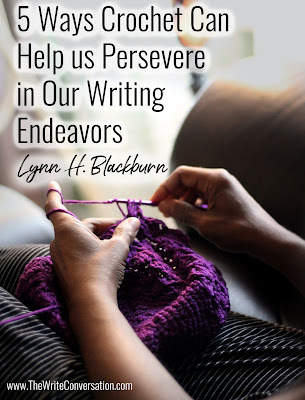
by Lynn H. Blackburn @LynnHBlackburn
When I’m not writing or reading, I like to knit and crochet. I usually focus on small projects that I can complete in a few hours. They give me that little “I finished it” thrill which is in short supply in my one-book-a-year writing life.
A few weeks ago, I had the *joy* of experiencing significant flight delays that left me chilling in the airport with time on my hands. I pulled out my crochet project and whipped up a few little coasters in a colorway that I find soothing.
And of course, because I can relate anything to writing, I started thinking about the similarities between my favorite creative pursuits.
It turns out that there’s a lot to learn from the things I have no problem with when it comes to crochet but that I struggle with in my writing life.
5 Things Crochet Can Remind Me About Writing
1. If I don’t pick up a hook for a while, I forget how to make even the most basic stitches.
I have to bust out some YouTube videos or online instructions to remind myself how to do what I claim I know how to do. But when I crochet daily, even if it’s just for a few minutes, it’s like my hands just know what to do, and they do it.
Same with writing. I may (cough, cough) know a writer who has had a lot on her plate/mind/heart for the past few months and recently had to look up her hero’s last name. Because…she forgot. She’d been away from her manuscript for too long. Way too long.
This particular writer has been through this before. And she knows that once she starts writing again, the words will flow. Her hands and mind and heart will sync, and she’ll be able to create a story. But when she has to start over after a long time away? It hurts.
Because she knows it hurts, she puts it off. Which just means it will hurt worse to start. When she finally gets back to it, she spends several days remembering how to do something she claims to know how to do.
There’s a lesson here about not taking long breaks, but that’s too convicting so I’m not going to bring it up.
2. Even when you follow a pattern, the end result will be uniquely yours.
Why is this? Well, every crocheter has their own way of holding the yarn and hook. Some crochet tight. Some loose. Some will choose to follow the pattern but use a larger hook or a thinner yarn. And each artist will choose the yarn that they find most appealing.
Same with writing. You could hand twenty different writers the same basic story idea and you would get twenty different versions. You’d get poetry, historical, fantasy, and romance. Some would be short, some long. All would be unique to their author.
Every writer brings their own life experiences, opinions, dreams, and style to every story. That’s why there’s always room for a new storyteller to join our ranks.
3. Sometimes you have to start over.
There are many reasons for this. For me it’s usually because I forgot to count, and I’ve added/dropped stitches and the square I was trying to make is now a trapezoid. Sometimes it’s because I think I’m doing it right and then realize I took a wrong turn with the instructions and there’s no saving it. It’s painful to unravel all that work, but I chalk it up to a learning experience and start again.
Same with writing. For me, writing the first few chapters of any story is as headache inducing as going without coffee. #donotrecommend
One thing that has helped me is to realize that when I have to start over or cut huge portions of work to send the story in a different direction, that the time wasn’t wasted. I learned about my characters, and I figured out what not to do. It’s painful, but the sooner I accept it and do what must be done, the better.
4. Over time, you might decide to try something new.
I started my needlework journey with cross stitch when I was very young. I learned to knit when I was a new mom. And then a few years ago I tried my hand at crochet. I haven’t cross stitched in years. These days I mostly knit and crochet.
Same with writing. You might start out writing poetry and then one day decide to have a go at a memoir. You might be writing nonfiction and then one day realize there’s an urban fantasy story brewing in your brain. Maybe you’re a romance author who tackles a Bible study.
There’s no limit, writer friends! Your creativity will expand and refocus over the years. The beautiful thing is that you can choose to explore any or all of it whenever you want.
Because…
5. The true joy of crochet is in the process, not the finished product.
Don’t get me wrong, I like to finish projects! But mostly, I enjoy exploring new stitches and having something soft and beautiful in my hands.
Same with writing. I know. I know. The publishing journey focuses on the finished product. I get it. I’m on a deadline myself.
But sometimes, I write for no reason other than that I enjoy it. When I do, I remember that I actually love to write! I love shaping the words and watching something beautiful develop as I return to the keyboard again and again.
Do you have a favorite hobby that has taught you about writing? I’d love to hear your story!
Grace and peace,Lynn
TWEETABLE5 Ways Crochet Can Help us Persevere in Our Writing Endeavors from author @LynnHBlackburn on @EdieMelson (Click to Tweet)
 Lynn H. Blackburn loves writing romantic suspense because her childhood fantasy was to become a spy, but her grown-up reality is that she's a huge chicken and would have been caught on her first mission. She prefers to live vicariously through her characters and loves putting them into all kinds of terrifying situations while she's sitting at home safe and sound in her pajamas!
Lynn H. Blackburn loves writing romantic suspense because her childhood fantasy was to become a spy, but her grown-up reality is that she's a huge chicken and would have been caught on her first mission. She prefers to live vicariously through her characters and loves putting them into all kinds of terrifying situations while she's sitting at home safe and sound in her pajamas! Unknown Threat, the first book in her Defend and Protect series, was a 2021 Christy Award finalist and her previous titles have won the Carol Award, the Selah Award, and the Faith, Hope, and Love Reader’s Choice Award. Malicious Intent, the second book in the series, released March 2022.
She is a frequent conference speaker and has taught writers all over the country. Lynn lives in South Carolina with her true love and their three children. You can follow her real life happily ever after by signing up for her newsletter at LYNNHBLACKBURN.COMand @LynnHBlackburn on BOOKBUB, FACEBOOK, TWITTER, PINTEREST, and INSTAGRAM.
Featured Image: Photo by Imani on Unsplash
Published on August 02, 2023 22:00
August 1, 2023
7 Steps in Writing the Heroes Journey
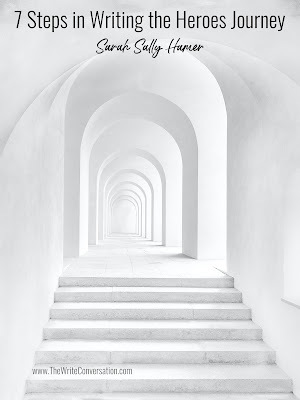
by Sarah Sally Hamer @SarahSallyHamer
Because I’m a writer and teacher of writing, I became acquainted with Joseph Campbell’s version of The Hero’s Journey decades ago. Its basic structure, one of an understanding of the journeys we all take during our lifetime, is also the basis of almost every story told, no matter when, who, or where in the world it was told. Every continent, every culture, every era since humans began to tell stories—probably before and after hunts where they danced around a campfire—have the same structure. (NOTE: I use Hero and Heroine interchangeably.)
Of course, writing stories isn’t the only use of The Hero’s Journey. It actually is the foundation of how our lives work. We follow the same path as do the heroes and heroines we read about or watch on a TV screen. Our video games are wrapped around a journey that includes times of great adventure, great despair, and great courage. In our “real” life, we have questions to answer, conundrums to solve, villains and dragons to slay, and a time of not knowing what to do next. But we persevere, we determined humans, and we create a better place for us, our families, our world. This is The Heroine’s Journey.
This Journey has many stops along the way. We’re going to concentrate on seven steps, although different people use different numbers, because I like to keep it simple.
7 Steps for Writing the Heroes Journey
1. Ordinary World
We all start somewhere. Our Ordinary World is a culmination of everything that has happened to us up to this point. It’s our point of view, our worldview, our story—all the things that meld together to make us the “I am”. What do you believe? What do you think? Why do you make the decisions you do? How do you react to various situations? In other words, who are you, exactly?
2. Initial Understanding
What is your “Need to Change” Pattern? What is currently going on in your life? Do you see something you’re not happy with? Why? What frequency are you holding? Is it working for you? This is the place where Dorothy in The Wizard of Ozsings her song about where she could be happy, if she was just on the other side of the rainbow. Are you happy where you are or should you change something to find that sweet spot?
3. Recognition of the need to change something in your life.
Other people can see the “real” you, often better than you yourself can. We attract these people into our lives to show us what isn’t going well and what needs to be examined and changed. Look around you. What do you see? Are you in a healthy, happy relationship with your family, friends, work, and people you casually come into contact with? Or do you find yourself constantly in turmoil and unhappiness? This is what you’re reflecting on the world, based on who you actually are inside. The mask must come off and the reality of who you are must be revealed.
4. Revealing the Hidden
Reveal the truth of who you are. The lies, the terrors, the goblins within are old survival habits. Although our society demands that we control our worst instincts, we often are forced into being something we’re not. We’re told who we are—given labels—by the people who surround us from birth: You’re so dumb! You know better! Don’t slam the door! Girls can’t do math. Boys can’t cry. So, that’s who we become, a conglomerate of the ideas of who we should be according to our parents, siblings, teachers, friends. By opening the door to our inner selves, we are given the chance to see what we can do to truly “Know Thyself” as is written above the door into the Delphi Temple in Greece, and become the person we deserve to be.
5. We are Divinely Supported
Spirit, Divine, God—whatever the term you decide to use—is available and willing to help you. You only need ask.
6. The Battle for Our Self
Now, we make choices. Do we truly want to change? When does the pain become greater than the fear? Can we step forward and truly become what we deserve to be?
7. Winning the Battle
We have gone through the layers of the journey, discovering the obstacles that have held us back. Now, with the bright light of day shining on our old fears, we can create new and wonderful patterns and new paths to happiness, health, success, and peace of mind.
Yes, this is the pattern in almost every story you’ve ever been told. Since the journey is based on humans, it’s a completely human experience.
What is your experience? Is it truly yours or is it something you’ve been told is yours?
Who are you?
TWEETABLE7 Steps in Writing the Heroes Journey with @SarahSallyHamer on @EdieMelson (Click to Tweet)
 Sarah (Sally) Hamer, B.S., MLA, is a lover of books, a teacher of writers, and a believer in a good story. Most of all, she is eternally fascinated by people and how they 'tick'. She’s passionate about helping people tell their own stories, whether through fiction or through memoir. Writing in many genres—mystery, science fiction, fantasy, romance, medieval history, non-fiction—she has won awards at both local and national levels, including two Golden Heart finals.
Sarah (Sally) Hamer, B.S., MLA, is a lover of books, a teacher of writers, and a believer in a good story. Most of all, she is eternally fascinated by people and how they 'tick'. She’s passionate about helping people tell their own stories, whether through fiction or through memoir. Writing in many genres—mystery, science fiction, fantasy, romance, medieval history, non-fiction—she has won awards at both local and national levels, including two Golden Heart finals.A teacher of memoir, beginning and advanced creative fiction writing, and screenwriting at Louisiana State University in Shreveport for over twenty years, she also teaches online for Margie Lawson at WWW.MARGIELAWSON.COM. Sally is a free-lance editor and book coach at Touch Not the Cat Books, with many of her students and clients becoming successful, award-winning authors. You can find her at HAMERSE@BELLSOUTH.NET or WWW.SALLYHAMER.BLOGSPOT.COM
Featured Image: Photo by Robin Schreiner on Unsplash
Published on August 01, 2023 22:00



